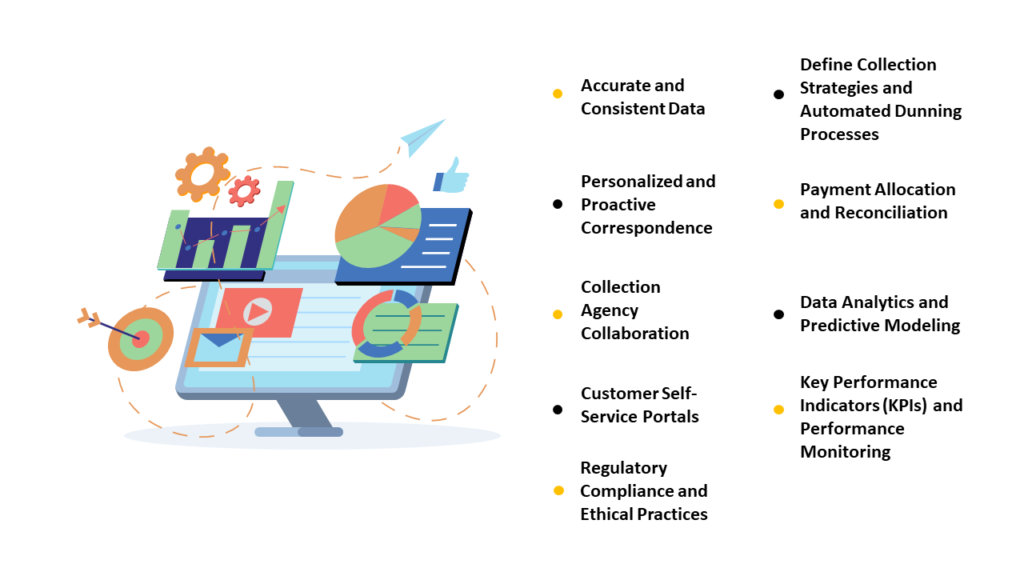Effective implementation of comprehensive best practices enables organizations to optimize collection management within SAP FS-CD. By strategically planning, optimizing processes, utilizing advanced analytics, and adopting customer-centric approaches, businesses can enhance debt recovery rates, improve customer satisfaction, and achieve overall financial performance.
To ensure effective collection management in SAP FS-CD, it is important to follow best practices that optimize processes and improve debt recovery. Here are some key best practices:

- Accurate and Consistent Data: Maintain accurate and up-to-date customer data within the FS-CD system. Ensure that customer contact information, payment terms, and other relevant data are consistently captured and updated in the system. This facilitates effective communication and enables proper assessment of delinquency status.
- Define Collection Strategies and Automated Dunning Processes: Define clear and well-defined collection strategies within SAP FS-CD. Determine the appropriate actions to be taken at different stages of the collection process, such as reminder letters, dunning notices, or escalations to collection agencies. Align collection strategies with business objectives and risk tolerance. Leverage the automated dunning functionality within SAP FS-CD. Configure and schedule dunning processes to run at regular intervals, generating dunning letters and notices automatically. This reduces manual effort, ensures consistency, and improves efficiency in reaching out to customers with outstanding debts.
- Personalized and Proactive Correspondence: Customize dunning letters and correspondence templates to suit your organization’s brand and tone. Tailor communication to address specific customer situations and encourage timely payment. Personalized correspondence helps maintain a positive customer experience while reminding customers of their payment obligations. Also, establish proactive communication channels with customers. Send reminders for upcoming payment due dates and follow up promptly in case of missed payments. Encourage customers to provide “promise to pay” commitments and monitor compliance. Timely communication helps maintain a positive relationship and improves the likelihood of successful debt recovery.
- Payment Allocation and Reconciliation: Ensure accurate and timely allocation of customer payments to their respective accounts. Implement robust reconciliation processes to match incoming payments with outstanding balances. This minimizes errors, prevents misallocations, and provides an accurate view of account statuses.
- Collection Agency Collaboration: If using collection agencies, establish clear processes and guidelines for collaboration. Define criteria for account assignment, monitor agency performance, and ensure proper commission calculations. Regularly review agency activities and outcomes to maintain effective partnerships and optimize recovery efforts.
- Data Analytics and Predictive Modeling: Leverage data analytics and predictive modeling capabilities within SAP FS-CD to identify patterns and trends in customer behavior, payment patterns, and debt recovery rates. Analyze historical data to gain insights into the effectiveness of collection strategies and optimize future actions. Predictive modeling can help identify high-risk accounts and prioritize collection efforts accordingly.
- Customer Self-Service Portals: Implement customer self-service portals where customers can access their account information, make payments, or set up payment plans. Self-service options empower customers to take control of their payment obligations, reducing the workload on collection teams and increasing the likelihood of timely payments.
- Key Performance Indicators (KPIs) and Performance Monitoring: Establish relevant KPIs for collection management, such as collection rates, average days sales outstanding (DSO), or recovery rates. Monitor these metrics regularly and compare them against predefined targets. Identify performance gaps and take corrective actions to improve overall collection effectiveness.
- Regulatory Compliance and Ethical Practices: Ensure that collection activities comply with applicable laws and regulations, including fair debt collection practices. Train collection teams on legal requirements, ethical practices, and customer privacy. Implement policies and procedures that prioritize customer rights and maintain a positive brand image.
If you are interested in understanding best practices for collection management in FS-CS that can benefit your business, please contact us at noshtek.com

Looking for expertise and excellent know-how in matters of SAP Contract Accounting and Payment Engine?
Aashish Garg
Managing Partner -Billing and Payments
17+ Years of SAP experience with core competencies in system & solution architecture, business process design, project management, account management, and finance transformation. Skilled in SAP Core Insurance Suite, SAP FS-CD, Payment Transactions, SAP CRM, SAP TM, SAP EM.
Industry exposure: Insurance, Transportation Management, Telecom, Retail, and Customer Relationship Management.

